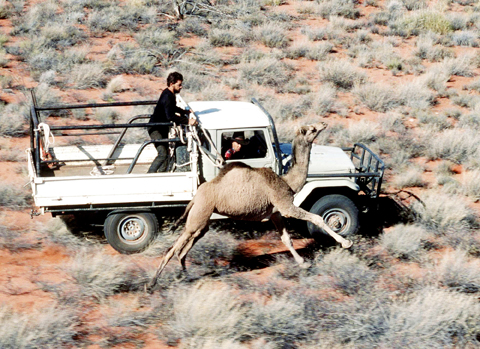Thousands of camels in Australia’s remote Outback could be killed by marksmen in helicopters under a government proposal aimed at cutting down the population of the havoc-wreaking creatures.
First introduced into Australia in the 1840s to help explorers travel through the Australian desert, there are now about 1 million camels roaming the country, with the population doubling every nine years.
They compete with sheep and cattle for food, trample vegetation and invade remote settlements in search of water, scaring residents as they tear apart bathrooms and rip up water pipes.

PHOTO: AP
Last month, the federal government set aside A$19 million (US$16 million) for a program to help slash the population. Besides sending in sharpshooters in helicopters and on foot, officials are considering proposals to turn some of the creatures into tasty treats such as camel burgers.
Hunters in the US have shot wolves from helicopters in Alaska in an aerial predator control program there. More than 800 wolves have been killed as part of the program, which has been a point of national controversy since it was initiated five years ago.
Glenn Edwards, who is working on drafting the Australian government’s camel reduction program, said the population needs to be slashed by two-thirds to reduce catastrophic damage.
But some remain opposed to a mass slaughter. Camel exporter Paddy McHugh, who runs camel catching operations throughout Australia, said a cull would be ineffective.
“What happens in 15 years when the numbers come back again? Do we waste another 20 million [Australian dollars]?” McHugh said.
The camels McHugh’s associates capture are sold overseas, used in tourism and processed for their meat. In recent years, McHugh said he has seen an explosion in international demand for the animals.
The main problem with trying to capture and export the animals is that they can grow up to 2.1m tall and weigh 900kg, said Patrick Medway, president of the Wildlife Preservation Society of Australia.
“You imagine trying to catch a lion or a tiger or an elephant in its native habitat and then bring it back and sell it to another country,” Medway said.
Tony Peacock, chief executive officer of the University of Canberra’s Invasive Animals Cooperative Research Center, said a cull was the most effective method.
“To be shot from a helicopter is actually quite humane, even though that sounds brutal,” he said. “If I was a camel, I’d prefer to just get it in the head.”
Mark Pearson, of the animal welfare group Animal Liberation New South Wales, offered another solution: drugging the animals to render them infertile.
But Edwards said even if you could get close enough to administer birth control, camels still live up to 30 years — meaning decades more damage to the environment.
Edwards favored an integrated approach that would include shooting some camels for their meat, with others left behind to decompose.

Kehinde Sanni spends his days smoothing out dents and repainting scratched bumpers in a modest autobody shop in Lagos. He has never left Nigeria, yet he speaks glowingly of Burkina Faso military leader Ibrahim Traore. “Nigeria needs someone like Ibrahim Traore of Burkina Faso. He is doing well for his country,” Sanni said. His admiration is shaped by a steady stream of viral videos, memes and social media posts — many misleading or outright false — portraying Traore as a fearless reformer who defied Western powers and reclaimed his country’s dignity. The Burkinabe strongman swept into power following a coup in September 2022

‘FRAGMENTING’: British politics have for a long time been dominated by the Labor Party and the Tories, but polls suggest that Reform now poses a significant challenge Hard-right upstarts Reform UK snatched a parliamentary seat from British Prime Minister Keir Starmer’s Labor Party yesterday in local elections that dealt a blow to the UK’s two establishment parties. Reform, led by anti-immigrant firebrand Nigel Farage, won the by-election in Runcorn and Helsby in northwest England by just six votes, as it picked up gains in other localities, including one mayoralty. The group’s strong showing continues momentum it built up at last year’s general election and appears to confirm a trend that the UK is entering an era of multi-party politics. “For the movement, for the party it’s a very, very big

ENTERTAINMENT: Rio officials have a history of organizing massive concerts on Copacabana Beach, with Madonna’s show drawing about 1.6 million fans last year Lady Gaga on Saturday night gave a free concert in front of 2 million fans who poured onto Copacabana Beach in Rio de Janeiro for the biggest show of her career. “Tonight, we’re making history... Thank you for making history with me,” Lady Gaga told a screaming crowd. The Mother Monster, as she is known, started the show at about 10:10pm local time with her 2011 song Bloody Mary. Cries of joy rose from the tightly packed fans who sang and danced shoulder-to-shoulder on the vast stretch of sand. Concert organizers said 2.1 million people attended the show. Lady Gaga

SUPPORT: The Australian prime minister promised to back Kyiv against Russia’s invasion, saying: ‘That’s my government’s position. It was yesterday. It still is’ Left-leaning Australian Prime Minister Anthony Albanese yesterday basked in his landslide election win, promising a “disciplined, orderly” government to confront cost-of-living pain and tariff turmoil. People clapped as the 62-year-old and his fiancee, Jodie Haydon, who visited his old inner Sydney haunt, Cafe Italia, surrounded by a crowd of jostling photographers and journalists. Albanese’s Labor Party is on course to win at least 83 seats in the 150-member parliament, partial results showed. Opposition leader Peter Dutton’s conservative Liberal-National coalition had just 38 seats, and other parties 12. Another 17 seats were still in doubt. “We will be a disciplined, orderly